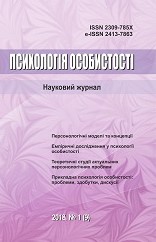З ДОСВІДУ ЗАСТОСУВАННЯ АВТОБІОГРАФІЧНОГО НАРАТИВУ В ОРГАНІЗАЦІЙНІЙ ПСИХОЛОГІЇ: АКСІОЛОГІЧНА ОПТИКА
DOI:
https://doi.org/10.15330/ps.9.1.96-104Ключові слова:
автобіографічний наратив, наративна психологія, аксіологічна психологія, орга¬нізаційна психологія, особа як інтегральний суб’єкт, конфлікт, вища школа., autobiographical narrative, narrative psychology, axiological psychology, organizational psychology, person as an integral subject, conflict, higher school.Анотація
З позицій постнекласичної раціональності та пост-постмодерністських пошуків холістичного підходу до трактування психології особи як інтегрального суб’єкта життєздійснення висвітлено досвід застосування автобіографічного наративу в контексті управління і розв’язання складних (часто заміщених) конфліктів у організаційному середовищі вищої школи. Стверджується, що такий наратив конструюється суб’єктом як автором власного життя й інсайдером у царині унікального життєвого досвіду та репрезентанта особистісно значущих прагнень і цілей. Діалогічна інтенція автобіографічного наративу потребує достовірного опису суб’єктивної реальності Автора у спосіб первинного феноменологічного вчування – занурення у світ інтимних переживань і метафоричних кодів несвідомого і вторинного дискурсивного впорядкування описаних подій та їх оцінок шляхом розгляду індивідуальної історії в контексті реальних міжособистісних стосунків (інтерпретація для себе і тлумачення для Іншого власної версії прожитого і пережитого).
Аргументовано аксіопсихологічні критерії валідності автобіографічного наративу як засобу ініціювання з боку керівника продуктивної діалогічної комунікації задля зміцнення здорових тенденцій розвитку освітньо-наукових організацій в контексті євроінтеграційних процесів, гармонізації персональних траєкторій професійно-кар’єрного зростання у межах первинного колективу; посилення особистої відповідальності за результати морального самовизначення в критичних ситуаціях; формування толерантності до невизначеності та готовності до ухвалення нестандартних рішень як можливості підтримати перспективні лінії розвитку, відкинувши ригідні, застарілі практики освітнього менеджменту.
From the standpoint of post-non-classical rationality and post-postmodernist searches for a holistic approach to the interpretation of person's psychology as an integral subject of life realization the experience of using autobiographical narrative in the context of managing and solving complex (often substituted) conflicts in the organizational environment of higher education is highlighted. It is stated that such a narrative is constructed by the subject as the author of his own life and the insider in the field of unique life experience as well as the representative of personally meaningful desires and goals. The dialogical intention of the autobiographical narrative requires an authentic description of the subjective reality of the Author in the way of primary phenomenological feel - immersion into the world of intimate experiences and metaphorical codes of the unconscious, and thus discursive ordering of the described events and their assessments through the consideration of individual history in the context of real interpersonal relationships (interpretation for himself and explanation of his own version of experienced to Another).
The axiopsychological criteria of the validity of autobiographical narrative as a means of initiation of productive dialogical communication by the leader for strengthening the healthy tendencies of the development of educational and scientific organizations in the context of eurointegrational processes, harmonization of personal trajectories of professional and career growth within the initial collective; strengthening of personal responsibility for the results of moral self-determination in critical situations; the formation of tolerance to uncertainty and readiness to adopt non-standard decisions as an opportunity to support promising developmental lines by having separated them from rigid, outdated practices of educational management are argued.

